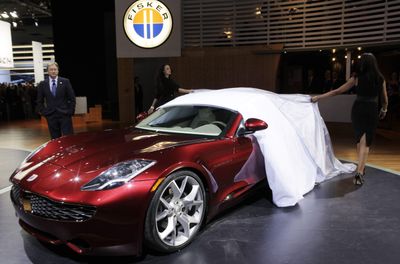Niche automakers hope buyers plug in
New electric cars in their own eco-luxury class

DETROIT – Several startup automakers are in hot pursuit of electric-powered vehicles, but they face an uphill road as they challenge major car companies like Toyota and General Motors in the race for the green car market.
California-based Tesla Motors Inc. and Fisker Automotive are displaying cars at the North American International Auto Show this week, grabbing attention with sleek electric-drive vehicles that combine environmentally friendly chic with sports car sex appeal.
Tesla, which started in 2004, showcased its $109,000 all-electric two-seat Roadster sports car at the Detroit show and hopes to unveil its Model S electric car in late February, CEO Elon Musk said in an address Tuesday before the Society of Automotive Analysts.
Musk announced that Tesla has been working with Daimler AG since late 2007 in a partnership to produce 1,000 electric Smart microcars. He said Tesla will produce the battery pack and charger for the vehicle, which is expected to be leased to customers.
“If the 1,000-vehicle fleet is a success and the economics make sense and the product is compelling, that will expand to tens of thousands of vehicles per year,” Musk said. “Daimler is really looking at this as a very serious product.”
Musk said the deal was nonexclusive and Tesla was looking to establish more strategic relationships with other automakers.
Fisker is showing off the production version of its $87,900 Karma plug-in luxury sports sedan, a four-seater with solar panels and the ability to drive gas-free for 50 miles. Fisker, which expects the cars to roll off the production line in October, also unveiled the Karma S, a convertible expected in 2011.
“We really don’t have any competition, at least in the next two years,” in the luxury plug-in segment, said Henrik Fisker, the company’s founder. “Being able to do 50 miles on electric-only and then drive after as a normal car, as a normal hybrid, there’s no other car that can do that.”
All swagger aside, the startups have plenty of doubters. Many question whether the niche companies will be able to survive the contraction of the U.S. auto market and the recent difficulty obtaining credit that is key to financing future growth.
“No matter what (the car) does, no matter what’s under the hood, you can’t sell tens of thousands of an $84,000 car in the U.S. today,” said Shai Agassi, founder and chief executive of Better Place, a Palo Alto, Calif., company developing electric vehicle networks. “The people who were in that buying market are not buying right now.”
Tesla said in October that it would push back the production of its Model S all-electric sedan, expected to have a more reasonable $60,000 price tag, until mid-2011 to focus on its Roadster and a profitable powertrain unit. The company said it would reduce its work force but did not elaborate.
The companies face the typical growing pains of a startup auto company along with the challenges of electric transportation, competing with billions of dollars in investments by General Motors Corp. and Toyota Motor Corp. GM is hoping to bring the Chevrolet Volt extended-range electric vehicle to the market by 2010, and Toyota outlined plans in Detroit to bring an all-electric car to market by 2012.
Jim Lentz, Toyota’s top U.S. sales executive, said the new companies likely will foster innovation and competition.
“At the price point where they’re entering the market, they’re at a very different place,” said Lentz, president of Toyota Motor Sales USA. “It’s interesting for us to look at the technologies and how they’re developing their electronics.”